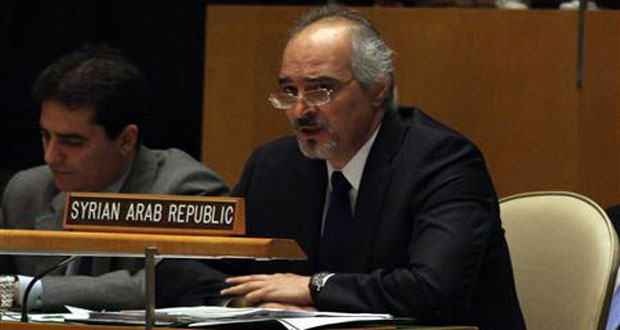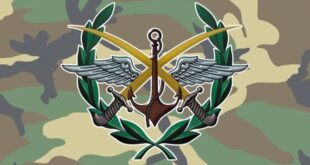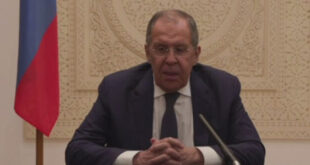New York, SANA – The Security Council on Friday evening adopted resolution no. 2170 on preventing the supporting, funding, and arming of the terrorists of the Islamic State of Iraq and Syria (ISIS) and Jabhat al-Nusra and preventing the flow of terrorists to Syria and Iraq.
The Council urged all UN member countries to take steps to prevent the flow of terrorists and bringing them to justice, in addition to address the issue of individuals who may be at risk of being recruited in order to prevent them from traveling to Syria and Iraq.
The resolution prohibits the direct or indirect sale of weapons and related items to ISIS, Jabhat al-Nusra, and individuals associated with them, listing six individuals affiliated with terrorist groups on the list of sanctions that affect Al Qaeda, asserting readiness to consider listing individuals, groups, establishments, and entities that support the two aforementioned organizations in the list, and this covers those who fund, arm, plan, recruit, and who are members in them through information technology.
The six individuals in question are Abdulrahman al-Zafer al-Dabidi al-Jahani, Hajjaj Bin Fahed al-Ajami, Abu Mohammad al-Adnani, Saeed Arif, Abdulmohsen Abdullah Ibrahim al-Sharekh, and Hamed Hamad Hamed al-Ali.
The Council voiced concern over the impact of the violent ideology and extremist acts of these two organizations on locals and on their role in causing sectarian tension, noting that ISIS members have been carrying out lethal attacks in Iraq and Syria during the past two weeks.
The Council denounced the terrorist acts of ISIS, describing it as a splinter group from Al Qaeda, in addition to voicing concern over the fact that the oil fields and associated infrastructure being controlled by ISIS and Jabhat al-Nusra provide them with income, which supports their recruitment efforts and ability to carry out terrorist attacks.
The resolution stipulates that freezing assets, prohibiting travel, and weapons embargo apply to ISIS and Jabhat al-Nusra members and all individuals, groups, establishments, and entities associated with Al Qaeda.
The Council instructed the team in charge of monitoring breaches in the sanctions on terrorist groups to report within 90 days on threats in areas where ISIS and Jabhat al-Nusra are active and provide recommendations to deal with this threat.
In a statement during the Security Council session, Syria’s Permanent Representative to the UN, Dr. Bashar al-Jaafari, said that this resolution is important and hotly-anticipated, particularly by Syria, due to the growing threat represented by ISI, Jabhat al-Nusra, and Al Qaeda-affiliated terrorist organizations which adopt violent and extremist ideals.
Al-Jaafari said that Syria had been fighting a grueling war against takfiri terrorist groups single-handedly on behalf of humanity, with the Syrian government making painstaking efforts to draw the UN members’ attention to the threat these organizations pose.
He pointed out that a number of influential countries in the Arab, regional, and international arenas exerted great efforts to cover up the truth of what is happening in Syria, and these countries continued to support, arm, harbor, fund, and provide media cover for terrorist groups, trying to pass them off either as moderate armed opposition or jihadist opposition.
Al-Jaafari noted that the Syrian government sent the Security Council and other UN bodies hundreds of letters, documents, pictures, videos, and names related to the crimes committed by terrorist groups like ISIS, Jabhat al-Nusra, the Islamic Front, and others, showing the horrifying acts of murder, torture, and terrorizing committed by these groups against innocent Syrian civilians, as well as the genocide-like attacks on certain parts of the Syrian and Iraqi societies, their methodical vandalism of infrastructure in Syria, and their theft and smuggling of petroleum which is sold abroad via Turkish and European brokers.
Syria’s Representative demanded to know who is buying Syrian petroleum from ISIS, and how this stolen petroleum is reaching Europe from Turkey, and how come Security Council members failed to address Syria’s constant complaints that were filed throughout the past three years on the exportation of weapons and terrorists from Libya to Syria via Turkey and Lebanon.
He said that all documents sent by Syria regarding this issue have been ignored deliberately, and that had they been considered and had the Security Council counterterrorism resolutions been applied, then the situation would not have reached the point it is at today.
Al-Jaafari hoped that the new resolution will be implemented optimally without discrimination or selectiveness, and that it will not infringe upon the relevant countries’ sovereignty, territorial integrity, or independence.
He asserted that counterterrorism is a priority for the Syrian government, which had often demanded that the Security Council take its concerns regarding this issue into considerations, urging the Council to hold dialogue among relevant and concerned countries before adopting such resolutions in the future.
Syria’s representatives said the Security Council must call on the countries that adopt and support extremist ideologies to issue official statements denouncing takfiri mentality, adding that the resolution should have referenced the destructive role played by channels broadcasting from Arab Gulf and Western countries and by takfiri websites, and that these channels and sites should be dealt with.
In a press conference following the session, al-Jaafari pointed out that the West’s considerations have shifted because its own security is at risk, as opposed to when terrorists were only killing Syrians, at which point the Western capitals were promoting them as proponents of freedom and democracy or as moderate opposition.
“When those terrorists began returning to their capitals, and when social media began revealing their reprehensible crimes, the West awoke to this tragedy,” he said, noting that Syria requested that the Islamic Front be listed among terrorism-sponsoring entities, but Western countries continue to refuse that, despite that this organizations commits heinous crimes like ISIS and Jabhat al-Nusra.
Al-Jaafari said the new resolution is positive, even if it came too late, and that it also overlooks Israel’s role in smuggling terrorists from Jordan to the disengagement zone in the occupied Syrian Golan, from which they enter Syria to commit their crimes, adding that the resolution also overlooks the role of Saudi Arabia and Turkey in supporting, arming, funding, and sending terrorists to Syria.
He said that the resolution mainly seeks to justify the West’s behavior and policies in the region, with them claiming to fight terrorism when they actually don’t want a resolution that really combats terrorism; rather they want absolution from terrorism and to be seen as being against ISIS and Jabhat al-Nusra.
Al-Jaafari also criticized the British representative who was chairing the meeting and who interrupted him and Iraq’s representative during their statements because “he sensed that we were going to say things that he doesn’t want the Western and Arab public opinion to hear.”
Hazem Sabbagh
 Syrian Arab News Agency S A N A
Syrian Arab News Agency S A N A




